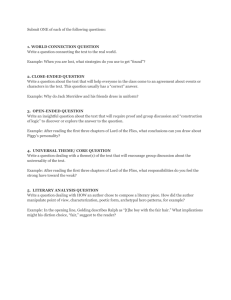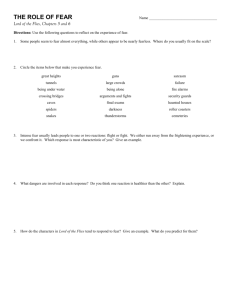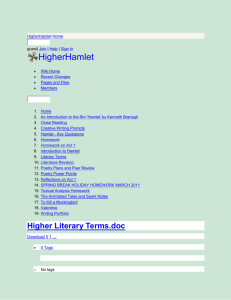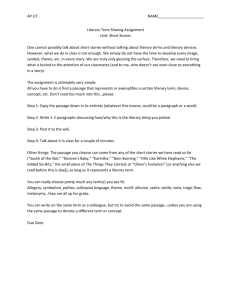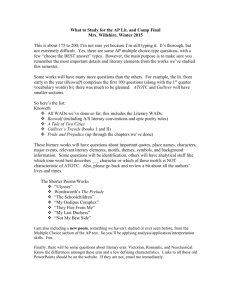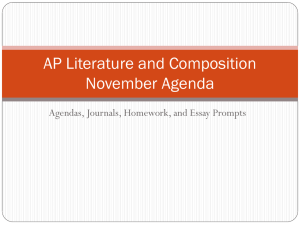English 11 final review ppt
advertisement
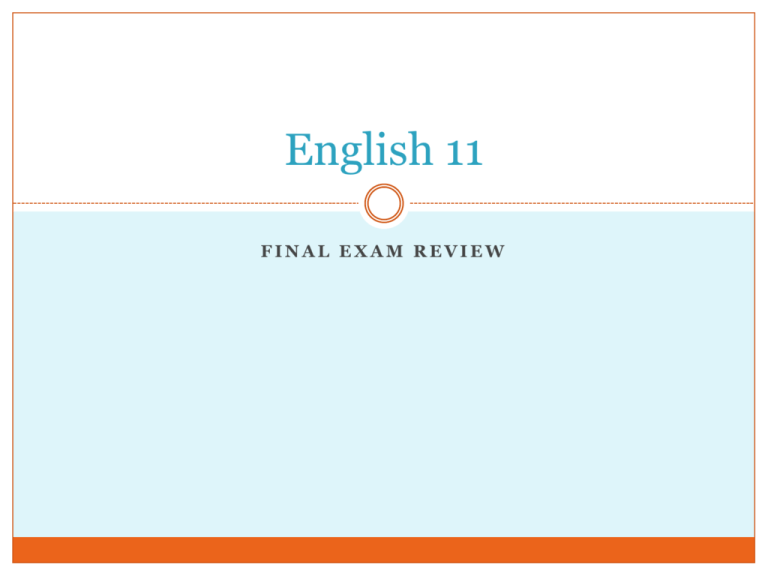
English 11 FINAL EXAM REVIEW Helpful Tips Read EVERYTHING on the final. This includes ALL instructions, captions, footnotes, etc. Review ALL literary devices Know the meanings of basic question words: INFER, ASSUME, ILLUSTRATE, ASSERTION, ANTECEDENT, EXCERPT, RHETORICAL QUESTION, RESTRICTIVE, IMPLICATION and CONCLUDE Section One: Passage Analysis In this section, you will be required to read a passage from a novel you have read this semester. You will also be required to read and compare themes in an essay and a poem you haven’t read. After each piece, there will be multiple-choice questions that ask you to analyze the readings. Section Two: Literary Terms Allegory: characters and elements are symbolic (Lord of the Flies) Allusion: reference to familiar person, place or thing Antithesis: 2 conflicting ideas in same passage Aside: when a character in a play speaks privately to the audience Connotation: the feeling of a word (positive or negative) Denotation: the actual meaning of the word Section Two: Literary Terms Denouement: the part of the plot where the conflict is resolved Dialect: the way in which a character speaks can provide characterization (Piggy in Lord of the Flies, Joseph in Wuthering Heights) Epic: lots of descriptions, supernatural elements, use of the classic hero (Beowulf) Epic Hero: usually tragic (Beowulf) Section Two: Literary Devices Simile: comparison using “like” or “as” Metaphor: comparison not using “like” or “as” “hope is the thing with feathers” Character Foil: characters offset each other (similarities) Ex. Hamlet/Laertes, Jack/Ralph Hyperbole: an extreme exaggeration; “I will love thee ‘til the seas gang dry.” Motif: idea presented in a work (LOTF: savagery) Pun: a play on words; “Ask for me tomorrow and you shall find me a grave man” Section Two: Literary Devices Satire: poking fun at society; in Brave New World the author satirizes class system and conformist behaviors Soliloquy: speech delivered by a character alone onstage revealing private thoughts and feelings (“To be or not to be” speech) Symbol: object stand for something beyond the literal meaning (conch shell = order) Section Two: Literary Devices Tone: the way in which the author feels toward a particular subject Tragic Hero: hero in any story who possesses a fatal flaw leading to the character’s downfall; Heathcliff = passion Hamlet = emotional Irony: opposite of what is expected Verbal, Situational, Dramatic Section Three: The literature of England Essential elements: rightful king, class system, imperialism, language changes Anglo-Saxon period: old English spoken (Beowulf) Middle Ages: Middle English spoken (The Canterbury Tales: allegorical, bawdy, morally instructive, satirical; Arthurian Legend) Renaissance: Shakespearean English; drama was enjoyed; lots of references to Greek and Roman mythology (Hamlet) Section Three: The literature of England Romanticism: individual, hatred for industrial revolution, poetry was main form of literature The Victorian Age: class system and marriages were key, dark time period (Wuthering Heights) Modernism: WWI-WWII time period of writing (Brave New World) Post-Modern: After WWII (Lord of the Flies) Section Four: Critical Essay In this section you will read a critique by another author on a work you have read this semester. You will then be required to answer multiple choice questions based on the passage. Section Five: Analysis of Structure On the final section of the exam, you will need to analyze passages in terms of tone, diction and style. We have done some really nice practice passages throughout the course (Wuthering Heights and Lord of the Flies), so find those and review.
